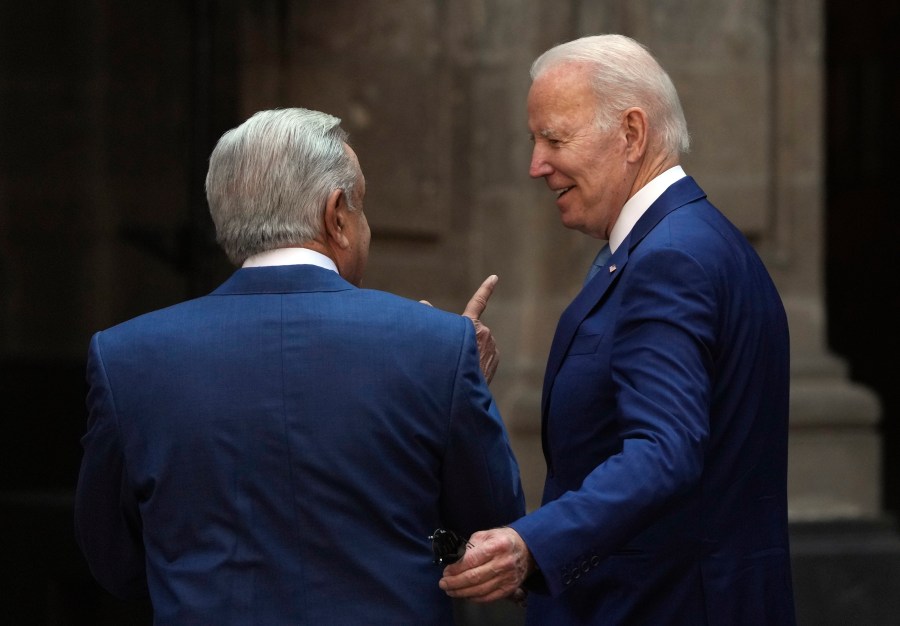What to know about the migrant caravan heading to the US
A migrant caravan departed Mexico’s southern city of Tapachula on Monday, as the Biden administration ratchets up pressure on Mexican President Andrés Manuel López Obrador to impose tighter limits on migrants crossing his country.
The reportedly 6,000-strong caravan is the largest organized group of migrants to form in Tapachula since 2022, when news of a similarly sized caravan threatened to overshadow the Summit of the Americas, hosted in Los Angeles by the Biden administration.
The new Christmas caravan promises to be a political headache for both President Biden and López Obrador, as Secretary of State Antony Blinken, Homeland Security Secretary Alejandro Mayorkas and White House homeland security adviser Liz Sherwood-Randall are due to meet the Mexican president Wednesday.
That meeting will follow phone conversations between the two presidents, in which López Obrador called on Biden to reduce sanctions on Cuba as part of a strategy to reduce migration in the hemisphere.
More coverage from The Hill
- Congresswoman dubs border agents under Biden ‘travel agents’
- Biden, Mexican president agree actions to reopen border ports are ‘urgently needed’
- Speaker Johnson urges Biden to take executive action on the border
- Texas governor’s move sets up showdown with feds over border
But according to local reports, the caravan is in part motivated by Mexican enforcement actions in Tapachula, near the border with Guatemala.
According to Diario del Sur, a local publication, more than 100,000 migrants are stalled in the city, awaiting paperwork allowing them free transit through Mexico.
In the past, Mexico’s strategy of slow-walking papers has led to unrest among migrants eager to leave the country’s poorest regions. That unrest can contribute to the organization of caravans, in which migrants travel together both for protection against organized crime and against extortion demands from corrupt Mexican officials.
According to reports, the caravan’s leaders are carrying banners calling the movement an “exodus from poverty,” and it is mainly composed of people from Cuba, Haiti and Honduras.
According to the BBC, activist Luis García Villagrán in part blamed the movement on the ease of crossing from Guatemala to Tapachula.
“The problem is that the southern border [with Guatemala] is open, and 800 to 1,000 people are crossing it daily. If we don’t get out of Tapachula, the town will collapse,” García Villagrán told the BBC.
Biden is under increasing pressure to reduce the number of U.S.-Mexico border apprehensions, a metric for immigration policy success largely set by Republicans but readily adopted by the Biden administration.
Customs and Border Protection (CBP) has reported more than 200,000 encounters at the southwest border for 16 of the last 24 months, and all signs point to similar statistics in December.
The Biden administration is telegraphing a revamped emphasis on immigration enforcement as a means to reduce those numbers by touting its deportation statistics, embracing concessions on border policy in favor of aid to Ukraine, and dealing directly on the matter with López Obrador.
López Obrador has proven to be an effective transactional partner to the United States on migration enforcement — his acquiescence to programs such as “remain in Mexico” under threat of tariffs from the Trump administration was essential to their application.

FILE – President Joe Biden and Mexican President Andres Manuel Lopez Obrador chat prior to having the official photo taken during the North America Summit, at the National Palace in Mexico City, Jan. 10, 2023. President Joe Biden and Mexican President Andres Manuel Lopez Obrador are two strong allies who don’t always get along personally. On Friday, they will meet to talk migration, fentanyl trafficking and Cuba relations.(AP Photo/Fernando Llano, File)
While Biden is unlikely to resort to such threats, CBP has closed major commercial border crossings because of manpower shortages, putting a strain on the Mexican economy and binational border communities, and spurring López Obrador to take quicker action.
But caravans like the one organized Thursday threaten to limit López Obrador’s range of action to deliver reduced numbers of encounters at the U.S.-Mexico border.
And López Obrador’s quid pro quos could upend other areas of Biden administration policy — López Obrador on Friday reiterated a longstanding demand that Biden soften his stance on Cuba, implicitly laying blame on U.S. policy in Latin America for the migrant exodus.
Copyright 2023 Nexstar Media Inc. All rights reserved. This material may not be published, broadcast, rewritten, or redistributed. Regular the hill posts







